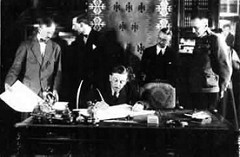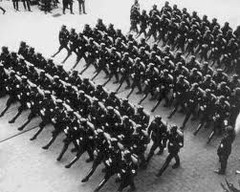Ww1 Vocabulary Answers – Flashcards
Unlock all answers in this set
Unlock answersquestion
Imperialism
answer
A policy in which a strong nations seeks to dominate other countries politically, economically, or socially
question
Alliance

answer
A union or association formed for mutual benefit, especially between countries or organizations.
question
Nationalism
answer
The belief that people should be loyal mainly to their nation—that is, to the people with whom they share a culture and history—rather than a king or empire.
question
Treaty of Brest-Litovsk

answer
In March 1918 Germany and Russia signed this treaty, ending the war between the two countries.
question
Militarism

answer
A policy of glorifying military power and keeping a standing army always prepared for war
question
Zimmerman Note
answer
A telegraph from Germany to Mexico in February 1917 intercepted by the U.S, in which Germany promised to help Mexico reconquer the United States if Mexico would ally with Germany in the war.
question
Triple Alliance
answer
A military alliance between Germany, Austria-Hungary, and Italy in the years preceding World War I
question
Lusitania
answer
a British passenger ship that was sunk off the Irish coast in 1915 by the German navy during World War I. Some of the 1195 people who were killed were Americans, and this made many Americans feel that the US should enter the war against Germany.
question
Archduke Franz Ferdinand
answer
Heir to the throne of Austria-Hungary who was assassinated by a Serbian, Gavrilo Princip, on June 28, 1914 triggering the start of World War I.
question
Central Powers
answer
In World War I, the nations of Germany and Austria-Hungary along with other nations that fought on their side.Bulgaria and the Ottoman empire join them later in the hopes of regaining their lost territories.
question
Kaiser Wilhelm II
answer
Ruler of Germany during World War I who wanted to show how powerful the Germany military was.
question
Triple Entente
answer
A military alliance between Great Britain, France, and Russia in the years preceding World War I
question
Armistice
answer
An agreement to stop fighting until later. ( this does not mean the conflict and war has ended)
question
Western Front
answer
In World War I, the region of Northern France where the forces of the Allies and the Central Powers battled each other.
question
Propaganda
answer
Information of material spread to advance a cause to damage an opponent's cause
question
Schlieffen Plan
answer
a battle strategy developed by Germany. here the plan called for attacking and defeating France in the West and then rushing east to fight Russia.
question
Rationing
answer
The limiting of the amounts of goods people can buy—often imposed by governments during wartime, when goods are in short supply.
question
Trench Warfare
answer
A form of warfare in which opposing armies fight each other from trenches dug in the battlefields
question
Total War
answer
A conflict in which the participating countries devote all their resources to the war effort.
question
Eastern Front
answer
In World War I, the region along the German-Russian border where Russian and Serbs battled Germans, Austrians, and Turks.
question
Unrestricted Submarine Warfare
answer
The use of submarines to sink without warning any ship (including neutral ships and unarmed passenger liners) found in an enemy's waters.
question
Allies
answer
In World War I, the nations of Great Britain, France, and Russia along with other nations that fought on their side
question
Treaty of Versailles
answer
The peace treaty signed by Germany and the Allied powers after World War I
question
War guilt clause
answer
Portion of the Versailles treaty that blames only Germany for causing the war. Major cause of the rise of national socialism in Germany (NAZI Party)
question
Reparations
answer
money paid by a defeated country after a war, for all the deaths, damage etc it has caused



